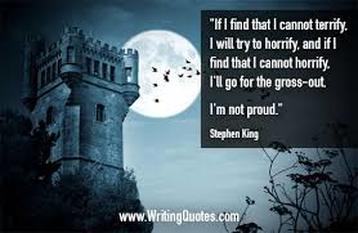TEN TIPS FOR WRITING HORROR STORIES

© Linda Style 2011
1. Writing horror is not as easy as it might seem. So get that out of your head.
2. Eschew clichés and stereotypes. Rattling chains and skeletons in the closet does not a horror story make. Those are simply props. What you need is a concern the reader can relate to on an emotional level.
3. Allow the reader to know things the main character doesn't. When the reader knows the ax murderer is just around the next corner, but the hero doesn't, the reader is going to feel fear for the hero.
4. Originality is king. It's hard to do, but even the most frequently used story types can be fresh with a new slant. Current stories about teenage vampires and the undead (zombies) are all new takes on old stories.
5. Blood, guts and gore - have their place. But don't forget, horror is about emotion...drawing on the reader's deepest fears. We might fear having our bodies inhabited by aliens, but the eerie tapping noise in the other room in the still of the night might instill even more fear.
6. Keep the ominous music going. Remember how it feels in a movie when the sound reflects the mood. Your words are the music. Start low and build to a high pitch... and then let the Guillotine fall with a thud.
7. Someone or something is killing people....but it's not the ghosts of the past. Ghosts go in and out of demand....as trends do, but if you must write about ghosts, make them unusual. How much more horrifying would it be to see your daughter's body inhabited by a ghost than to simply see one in the hallway.
8. Murder lurks around every bend. Lots of murders. Dead bodies and horror stories go together like...squirrels and acorns. What's a horror story without dead bodies? The reader wants dead bodies. Give him what he wants.
9. Keep the Suspense going. Never let the reader rest for long. Life is in danger. Your hero's life is in danger. And each dangerous moment is worse than the next. This doesn't mean a monster killer lurks around every corner. It means you've tapped into the hero's worst fear and he (along with the reader) worries about what's going to happen next.
10. Make it believable. Supernatural elements can only go so far in explaining things. There has to be a certain amount of realism for real fear to develop.
Okay, that's ten. Cue eerie horror music. Bwahahahahahah!
**Reprint or use of this work is forbidden unless permission is granted by the author.
1. Writing horror is not as easy as it might seem. So get that out of your head.
2. Eschew clichés and stereotypes. Rattling chains and skeletons in the closet does not a horror story make. Those are simply props. What you need is a concern the reader can relate to on an emotional level.
3. Allow the reader to know things the main character doesn't. When the reader knows the ax murderer is just around the next corner, but the hero doesn't, the reader is going to feel fear for the hero.
4. Originality is king. It's hard to do, but even the most frequently used story types can be fresh with a new slant. Current stories about teenage vampires and the undead (zombies) are all new takes on old stories.
5. Blood, guts and gore - have their place. But don't forget, horror is about emotion...drawing on the reader's deepest fears. We might fear having our bodies inhabited by aliens, but the eerie tapping noise in the other room in the still of the night might instill even more fear.
6. Keep the ominous music going. Remember how it feels in a movie when the sound reflects the mood. Your words are the music. Start low and build to a high pitch... and then let the Guillotine fall with a thud.
7. Someone or something is killing people....but it's not the ghosts of the past. Ghosts go in and out of demand....as trends do, but if you must write about ghosts, make them unusual. How much more horrifying would it be to see your daughter's body inhabited by a ghost than to simply see one in the hallway.
8. Murder lurks around every bend. Lots of murders. Dead bodies and horror stories go together like...squirrels and acorns. What's a horror story without dead bodies? The reader wants dead bodies. Give him what he wants.
9. Keep the Suspense going. Never let the reader rest for long. Life is in danger. Your hero's life is in danger. And each dangerous moment is worse than the next. This doesn't mean a monster killer lurks around every corner. It means you've tapped into the hero's worst fear and he (along with the reader) worries about what's going to happen next.
10. Make it believable. Supernatural elements can only go so far in explaining things. There has to be a certain amount of realism for real fear to develop.
Okay, that's ten. Cue eerie horror music. Bwahahahahahah!
**Reprint or use of this work is forbidden unless permission is granted by the author.